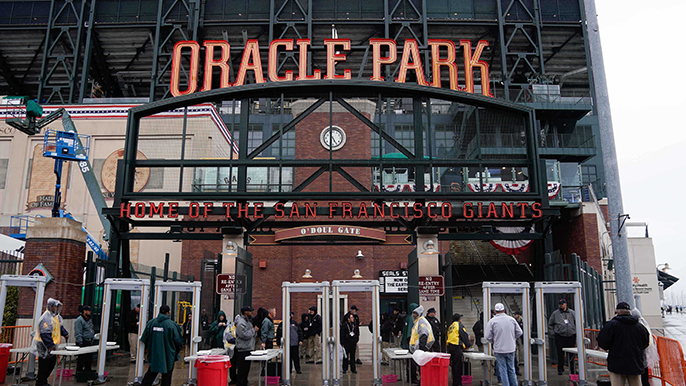
Major League Baseball has canceled two more regular season series, commissioner Rob Manfred announced Wednesday. Opening Day is postponed to April 14 at the earliest.
The two series include the Giants’ home opener against the Miami Marlins on April 8, followed by a three-game home series with the Padres. The league had already canceled SF’s first two series: a four-game series in San Diego and a road trip to Milwaukee.
San Francisco’s season opener, as of now, is April 15 in Cleveland on Jackie Robinson Day.
The league and players union have been fervently negotiating the collective bargaining agreement in MLB’s offices in New York since Monday. Offers have grown substantially closer on key economic issues than they did during marathon bargaining sessions in Jupiter, Fla., but the biggest hurdle is now MLB’s goal of implementing an international draft.
The MLBPA and management negotiated for roughly 17 hours from Tuesday into Wednesday and agreed to extend the deadline to save a 162-game season later into Wednesday. But now a full season appears unworkable.
On the luxury tax, which has been the main sticking point for weeks, the two sides reportedly made compromises. The starting point for 2022’s competitive balance tax threshold were only $2 million apart in the league and union’s offers.
Similarly, MLB and the players came together on the minimum salary; MLB offered a $700,000 floor that increases to $770,000 over the life of the CBA, while the MLBPA offered a $710,000 start to $780,000.
The two sides remained apart on the pre-arbitration pool, but the major component holding back a deal was an international draft.
MLB has reportedly included an international draft in several proposals, with the union consistently shooting it down. Many Latin American players oppose a draft, arguing that it would suppress players’ earnings.
Currently, the international signing system is rife with issues. Players as young as 12 are recruited and occasionally make verbal agreements with teams. Buscones — agents — often take significant chunks of prospects’ future earnings. But instead of addressing some of the problems, critics argue the league allowed them to fester and make it look like a draft — which would likely save owners’ money over time — is the only tenable solution.
According to ESPN’s Jesse Rogers, the league gave the MLBPA three options to choose from as it relates to an international draft. One was to trade an international draft — implemented in 2024 — in exchange for eliminating draft pick compensation for qualifying offers. Another was to take both direct pick compensation and the draft off the table. The third: eliminate draft pick compensation and allow the sides to “examine” an international draft with the caveat of re-opening CBA negotiations in three years if they can’t agree.
Instead of walking through any of those three doors, the MLBPA poked its head out a window; their counter, according to ESPN’s Jeff Passan, was to remove the qualifying offer for this year and set a Nov. 15 deadline to figure out an international draft system.
The owners shunned that offer, staying true to their promise that they’d only entertain further negotiations if the union agreed to one of those three options.
Failing to come to an agreement this time around only complicates things moving forward. Now the sides must negotiate all the terms they’ve been haggling over, plus how to handle service time for the 2022 season. Normally, a player earns one year of service time if he spends at least 172 days on the 26-man roster. Without the first two weeks of the season, that falls out of whack.
Players reach arbitration after three years of service time, and free agency after six. Cracking down on service time manipulation has been a key priority for the union, as clubs have held players in the minor leagues long enough to control them for an extra year before.
The work stoppage — already the second-longest in baseball history — has resulted in more lost games. And already, just minutes after the league made the announcement, MLB.com scrubbed every teams’ schedule.


